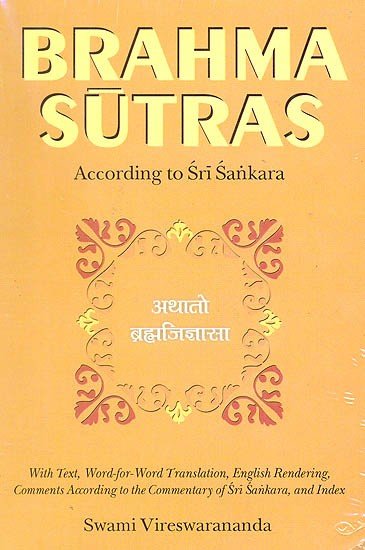Brahma Sutras (Shankara Bhashya)
by Swami Vireshwarananda | 1936 | 124,571 words | ISBN-10: 8175050063
This is the English translation of the Brahma-sutras including the commentary (Bhashya) of Shankara. The Brahma-sutra (or, Vedanta-sutra) is one of the three canonical texts of the Vedanta school of Hindu philosophy and represents an early exposition the Vedantic interpretation of the Upanishads. This edition has the original Sanskrit text, the r...
Chapter IV, Section III, Adhikarana V
Adhikarana summary: A released soul which has attained Brahmaloka can exist with or without a body according to its liking
Sutra 4,4.10
अभावं बादरिः, आह ह्येवम् ॥ १० ॥
abhāvaṃ bādariḥ, āha hyevam || 10 ||
abhāvaṃ—Absence (of body and organs); bādariḥ—Badari (considers); āha—(the Sruti) says;; hi—because; evam—thus.
10. There is absence (of body and organs, in the case of the released souls) (considers) Badari, because (the scripture) says thus.
In the previous Sutra it was told that if one attains Brahmaloka, by his mere wish things come to pass. This shows that that soul possesses a mind. The question naturally arises whether it possesses a body and the organs. Badari says that it does not, for the scripture says so. “And it is by means of this divine eye of the mind that he sees the desires and rejoices” (Chh. 8. 12. 5), which shows that it possesses only the mind and not the organs etc.
Sutra 4,4.11
भावं जैमिनिः, विकल्पामननात् ॥ ११ ॥
bhāvaṃ jaiminiḥ, vikalpāmananāt || 11 ||
bhāvaṃ—Existence; jaiminiḥ—Jaimini; vikalpa-āmananāt—because the scripture declares (the capacity to assume) diverse forms.
11. (The released soul) possesses (a body and the organs), considers Jaimini, because the scriptures declare (the capacity on the part of such a soul to assume) diverse forms.
“He being one becomes three, five, seven, nine” (Chh. 7. 26. 2). This text says that a released soul can assume more than one form, which shows that it possesses besides the xnind, a body and the organs. This is the view of Jaimini.
Sutra 4,4.12
द्वादशाहवदुभयविधं बादरायणोऽतः ॥ १२ ॥
dvādaśāhavadubhayavidhaṃ bādarāyaṇo’taḥ || 12 ||
dvādaśāhavat—Like the twelve days’ sacrifice; ubhayavidhaṃ—(is) of both kinds; bādarāyaṇaḥ—Badarayana; ataḥ—from this.
12. From this Badarayana (surmises) (that the released soul is) of both kinds, like the twelve days’ sacrifice.
From the twofold declaration of the scriptures Badarayana thinks that a released soul which has attained Brahmaloka can exist both ways—with or without a body according to its liking. It is like the twelve days’ sacrifice, which is called a Sattra as well as a Ahina sacrifice.
Sutra 4,4.13
तन्वभावे सन्ध्यवत्, उपपत्तेः ॥ १३ ॥
tanvabhāve sandhyavat, upapatteḥ || 13 ||
tat-abhāve—In the absence of a body; sandhyavat—as in dreams (which stand midway between waking and deep sleep); upapatteḥ—this being reasonable.
13. In the absence of a body (the fulfilment of desires is possible) as in dreams, since this is reasonable.
Sutra 4,4.14
भावे जाग्रद्वत् ॥ १४ ॥
bhāve jāgradvat || 14 ||
bhāve—When the body exists; jāgrat-vat—as in the waking state.
14. When the body exists (the fulfilment of desires is) as in the waking state.
